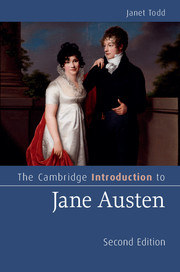Book contents
- Frontmatter
- Contents
- Preface to the second edition
- Preface to the first edition
- List of abbreviations
- 1 Life and times
- 2 The literary context
- 3 Northanger Abbey
- 4 Sense and Sensibility
- 5 Pride and Prejudice
- 6 Mansfield Park
- 7 Emma
- 8 Persuasion
- 9 Austenmania: Jane Austen's global life
- Afterword
- Notes
- Further reading
- Index
- Cambridge Introductions to …
7 - Emma
Published online by Cambridge University Press: 05 March 2015
- Frontmatter
- Contents
- Preface to the second edition
- Preface to the first edition
- List of abbreviations
- 1 Life and times
- 2 The literary context
- 3 Northanger Abbey
- 4 Sense and Sensibility
- 5 Pride and Prejudice
- 6 Mansfield Park
- 7 Emma
- 8 Persuasion
- 9 Austenmania: Jane Austen's global life
- Afterword
- Notes
- Further reading
- Index
- Cambridge Introductions to …
Summary
Emma is the most intricate, stylish, and elegant of Jane Austen's novels. Through a concentration on the perspective of the heroine, through internal monologue, and through the most complex use of free indirect speech, the reader is forced to identify with a character displaying some of Lydia Bennet's ‘self-consequence’ through ‘a faulty degree of indulgence’, to use Mr Collins's phrase; Austen wrote that Emma is a heroine ‘no one but myself will much like’ (Memoir, p. 119).
In contrast to the heroines that precede and follow her, Emma is little occupied with her motives and memory or with past events; being a plotter, she naturally looks to a future she expects to control – as it turns out, a futile endeavour, frequently hurtful to the unwitting pawns in her fantasy games. That the overall effect of the book is comic rather than cruel is due in part to the narrative techniques and in part to the sheer linguistic vitality of the fictive world, coupled with the attractive energy of the heroine. It is as if Jane Austen, having just insisted on her readers’ appreciation of the physically weak, inhibited Fanny Price, dares us to accept a rescue of Mary Crawford, another woman with a ‘lively mind’ and a desire to act with something of a man's freedom, and to see in her a resemblance to the approved Elizabeth Bennet after all. The title page reads ‘by the author of “Pride and Prejudice”‘, not Mansfield Park, the previous novel.
What struck the earliest readers of Emma was less its vitality than its lack of story. Disloyally, John Murray remarked that it wanted ‘incident and Romance’, and Maria Edgeworth, to whom Austen had sent a complimentary copy, read only the first volume and commented,
there was no story in it, except that Miss Emma found that the man whom she designed for Harriet's lover was an admirer of her own – & he was affronted at being refused by Emma & Harriet wore the willow – and smooth, thin water-gruel is according to Emma's father's opinion a very good thing & it is very difficult to make a cook understand what you mean by smooth, thin water-gruel!!
(FR, p. 231)To Edgeworth this lack of surface story was a failing, to Austen its strength.
- Type
- Chapter
- Information
- The Cambridge Introduction to Jane Austen , pp. 101 - 121Publisher: Cambridge University PressPrint publication year: 2015



